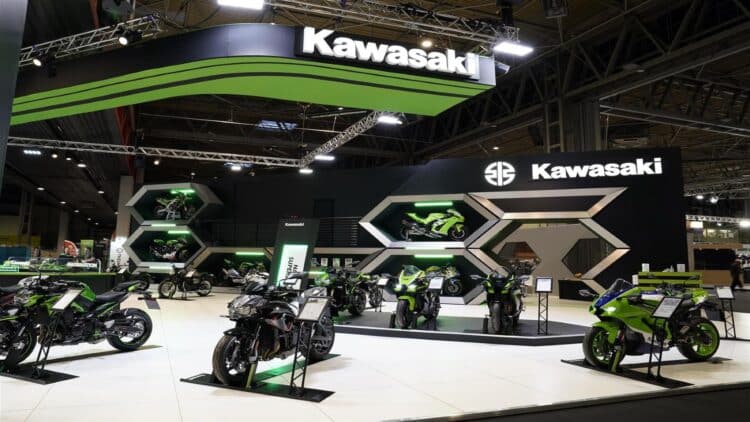Through its hydrogen project scheduled for 2030, Kawasaki initiated a radical change toward sustainable future development. The transportation industry faces a revolutionary change through this transformative program, which develops engines that operate on hydrogen to create water emissions. The article studies how Kawasaki’s current initiatives affect future transportation systems.
Kawasaki’s hydrogen motorcycle: a glimpse into the future
As the company launched to the world, Kawasaki showcased hydrogen motorbike technology. This forward-thinking bicycle demonstrates the successful development of sustainable transportation because it operates exclusively using water emissions. Kawasaki used the demonstration to demonstrate its dedication to carbon reduction and the promotion of cleaner alternative energy sources.
The technology behind the hydrogen motorcycle
The hydrogen motorcycle benefits from using an internal combustion engine (ICE) to consume hydrogen fuel. Through this technology, an engine creates power that leaves behind only water vapor to generate an environmentally safe alternative power to traditional gasoline engines. The motorcycle design illustrates that hydrogen is a feasible clean power source for personal vehicles.
The 2030 vision: Kawasaki’s ambitious hydrogen project
Research conducted at Kawasaki for hydrogen-powered motorcycles goes deeper than their research focus. The company intends to get certification for piston engines utilizing hydrogen as fuel in 2030. The organization has created a visionary goal that targets hydrogen technology deployment across the air and maritime transport sectors to decrease environmental impacts from aviation and marine transportation.
Expanding hydrogen technology to the aviation and marine sectors
Kawasaki’s 2030 objectives involve designing hydrogen-powered aircraft and ship engines. The power generation system in these engines runs on hydrogen fuel to reduce environmental pollution and fossil fuel usage. Engineering success in these certified engines should lead to a revolution toward sustainability in the aviation and marine sectors.
Through its use, hydrogen-based power systems help reduce environmental emissions
Hydrogen technology implements substantial environmental advantages for all users. Engine operation using hydrogen results in clean air emissions, with water vapor as the only byproduct. The technology provides an excellent method for transportation companies to minimize environmental effects and fight global warming. Kawasaki’s project demonstrates that hydrogen technology will drive industrial evolution through its ability to create a greener environment for the future.
Hydrogen serves as a solution to fight climate change
The versatile hydrogen energy source retains its vast availability as a fundamental tool for lowering the carbon footprint. The conversion from fossil fuels to hydrogen enables industrial facilities to reduce their emissions effectively. The hydrogen project at Kawasaki demonstrates how hydrogen technology creates transformations that advance climate change reduction worldwide.
The commercial value of Kawasaki’s project will transform the overall industry direction
The Kawasaki hydrogen project offers opportunities to revolutionize the transportation sector. By implementing hydrogen-powered engine technology, Kawasaki advances sustainable and innovative manufacturing. The motorcycle design illustrates that hydrogen is a feasible clean power source for personal vehicles. The project demonstrates promise for other manufacturers to develop hydrogen technology, which will result in broad-scale advancements in clean energy solutions.
The potential for industry-wide adoption
The achievement of Kawasaki’s hydrogen project will motivate additional businesses to develop their investment in hydrogen technology. The general application of hydrogen power systems by industrial sectors would significantly decrease carbon pollutants in multiple commercial operations. Moving to cleaner energy technologies will provide enhanced environmental benefits, expanded economic possibilities, and fresh employment prospects.
Kawasaki revealed its 2030 hydrogen project to launch the modern hydrogen revolution of the transportation sector. By creating hydrogen motorbikes, aircraft, and marine vessel technologies, Kawasaki is a pioneer in creating a cleaner, upcoming energy landscape. Through this advanced initiative, the company demonstrates how hydrogen-based technology can reduce emissions and drive cleaner energy solutions to establish new standards for responsible environmental innovation.


